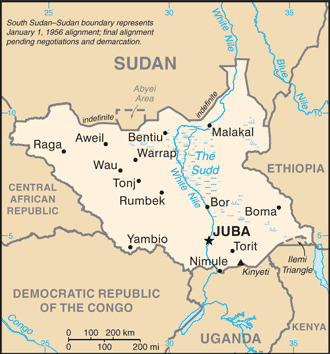South Sudan

South Sudan is the newest country in Africa- as well as the entire world- as of 2011. As one might expect, it broke off from the country of Sudan, following a long civil war and a vote in which over 95% of the people voted to split off. The reasons for the civil war and split are ethnic, religious, and economic; Sudan is mostly Arab and Muslim, while South Sudan is mostly non-Arab and Christian.[1] Furthermore, most of the oil in Sudan was located in the South, without which the government of Sudan would have a very hard time operating. Currently, there is an agreement to share the oil revenues between South Sudan (which is where the oil itself is located) and with Sudan (which has the pipelines which transport the petroleum to a port in their territory.)
Currently, South Sudan is underdeveloped, with very little infrastructure, a massive health crisis (extreme rates of infant mortality and diseases that have long since disappeared in western and even most African countries), and continuing instability in the border with Sudan to the north. The consequences of decades of neglect, violence and exploitation from the north have also led to a lack of schools. To top that off, the country is landlocked and dependent on Sudanese infrastructure to export oil, but this may change. There have been plans to build a second pipeline to transport South Sudan's petroleum through predominately Christian East Africa (Ethiopia, Kenya, etc) to a port on the Indian Ocean, instead of the Sudanese ports on the Red Sea. Since South Sudan is landlocked, it needs help from other countries to export its petroleum.
Statistics are hard to come by, but it was believed that until a couple of decades ago, the region that would become South Sudan overwhelmingly followed indigenous African religions, and that its conversion to Christianity went hand-in-hand with its liberation, much as East Timor's conversion to Catholic Christianity played a role in that country gaining independence from a much larger Islamic power, Indonesia. In any event, the liberation of South Sudan means the Sudanese government has lost about a third of its country, and most of the oil revenue. For the wider Arab Islamic world, it means an area the size of France is no longer Arab or Muslim territory. Considering the ongoing rebellion in Darfur (a Muslim but not Arab region in the western part of the country, not South Sudan), the prospects for the government in Khartoum are not looking very good.
The South Sudanese speak many African languages (mostly from the Nilo-Saharan family, but with a few Niger-Congo languages mixed in), but historically used English and Arabic for business. With the secession from Sudan in the north, the government has plans to change the official language used to English only, and there are plans to move the capital from Juba to another city, but as of this writing, nothing is final.
The South Sudanese flag

- ↑ While some reports call the South Sudanese "black" or "African", these terms are highly misleading: most Sudanese Arabs are in fact "black" in that they have very dark skin and distinctly African features (you couldn't tell a Sudanese Arab from, say, a Chadian just by looking at him). Much like "Latin American/Hispanic/Latino", "Arab" is a cultural-linguistic identity rather than a racial one; there are Arabs who are so "white" you'd think they were Russian or German if they didn't tell you otherwise, and there are black Arabs in Sudan, Egypt, and elsewhere, and there are Arabs of every shade in between. And of course Sudan is still in Africa and a member of the African Union.